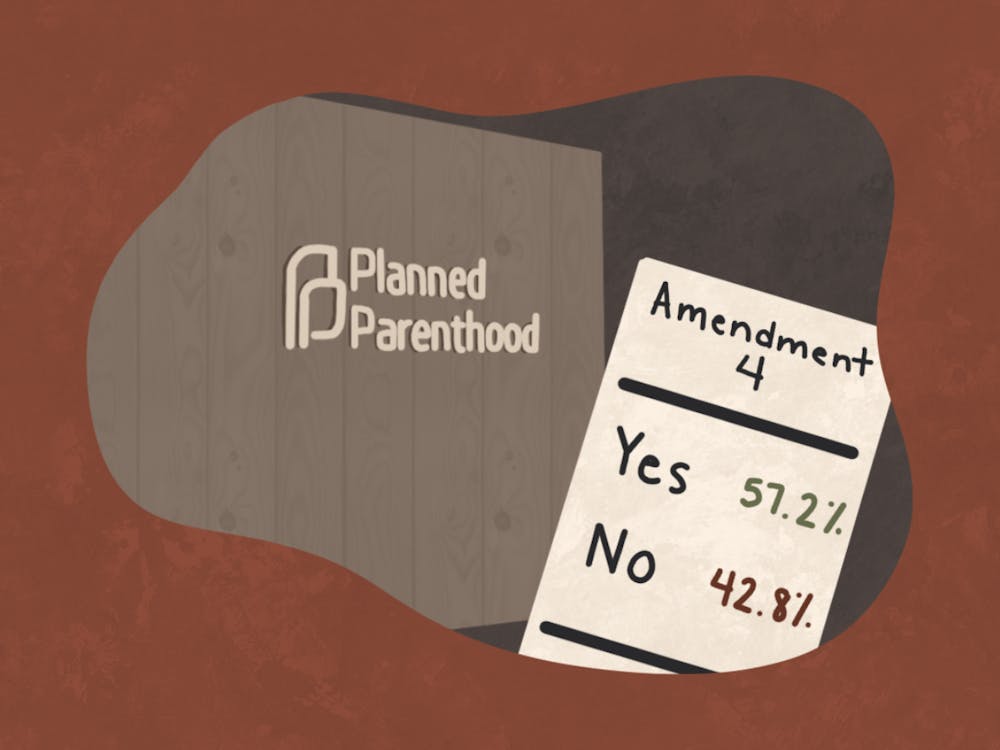Roe v. Wade federally ensured a woman’s right to an abortion. When it was overturned in 2022, many Floridians were outraged. Voters reached close to one million signatures to put the issue on the 2024 Election Day ballot.
Despite their efforts, it wasn’t enough.
The proposed amendment, which outlined limited state interference on a woman’s decision to seek an abortion, failed by 2.8%, or just over 300,000 votes. Out of a total of over 10 million votes placed, just over 6 million of the voters said “yes” on Amendment 4, narrowly missing the 60% majority needed to pass.
In the two weeks following the election, some women who were once hopeful for the state’s future say they’re disappointed and struggling to come to terms with post-election reality.
The amendment’s failure has brought to light some critiques of Florida’s requirements for passing changes. The 2006 amendment to raise the requirement from 50% to 60% received only 57.78% of vote itself, said Amanda Hiatt, Vice President of UF’s Planned Parenthood Generation Action, a student affiliate of Planned Parenthood.
“It's just super unfair and kind of backwards,” she said.
In the weeks leading up to Election Day, UF’s Planned Parenthood Generation Action hosted panels with doctors to speak on Florida’s six-week abortion ban previously in place. The Planned Parenthood affiliate works toward providing resources and information to students, including that of menstrual products and discrete, accessible contraceptive care.
At the beginning of the year, members of the organization also gathered signatures needed for Amendment 4 to appear on the ballot.
As outlined by the Florida Division of Elections, in order for a constitutional amendment to appear on the ballot, signatures equal to 8% of the total number of votes cast in the last presidential election must be collected — in this case, just under 900,000 signatures. Close to one million signatures were reached as of May 8, 2023.
Fast forward half a year to Election Day in Alachua County, and 68% of residents voted “yes” on Amendment 4, equaling 92,148 votes.
This was partially because of efforts like that of the Planned Parenthood affiliate, Hiatt said.
“I think that we definitely had an influential role in that, because we talked to a lot of voters all throughout the year about what Amendment 4 meant,” she said.
Both those who support abortion rights and those who oppose claim false information was spread about the amendment from the other party.
“This amendment does not change the Legislature's constitutional authority to require notification to a parent or guardian before a minor has an abortion,” the proposed amendment read.
A 2020 bill known as the Parental Notice of and Consent for Abortion Act prohibits a physician from performing an abortion on a minor unless signed, notarized consent is given by parents or a legal guardian, with some exceptions.
Donald Stahurski, Chair Emeritus of Florida Voice for the Unborn, took this wording in the amendment to mean it was eliminating parental consent as a whole.
“Even doctors can't give a Tylenol to a child without parental consent, and here they could have had an abortion without parental consent,” he said.
Some voters were similarly confused, unsure of the difference between parental consent and notification of an abortion, assuming both were the same, he said.
“A lot of people took that to mean one in the same when, of course, it's not the same thing as parental consent,” Stahurski said.
While some disagreed with the legality of the amendment, other “Yes on 4” voters are hoping the result is appealed, like Laura Goodhue, executive director of the Florida Alliance of Planned Parenthood Affiliates.
“People just need to understand that government and democracy doesn't end with the elections and that they need to keep advocating,” she said.
If the decision isn’t appealed, effects will be deadly, she said.
The Florida Constitution, which was adopted in 1968, has been amended 144 times, with the most recent in 2020 when voters cast ballots to approve four amendments. However, it has never been repealed following an amendment’s failure to pass, making a repeal unlikely.
But appeal or not, Floridians and United States citizens will always need abortion rights, she said.
“People are always going to need it no matter what, because things happen, it's life,” she said. “So when things do happen, having the government interfere is what people don't want, and that's the problem.”
Contact Kairi Lowery at klowery@alligator.org. Follow her on X @kairiloweryy.
Kairi Lowery is a third-year journalism major and a metro general assignment reporter for The Alligator. When she's not writing you can find her lounging on the beach with a book or collecting vinyls.






